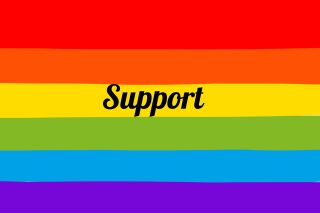Friends
Supporting LGBTQ+ Friends and Family as an Ally
Areas for active support of queer people in 2024, from religion to healthcare.
Posted May 5, 2024 Reviewed by Abigail Fagan
Key points
- Allyship helps promote positive social change.
- Those in the LGBTQ+ community would be helped by allies.
- Social support changes the neurobiology of both the receiver and the giver.

The United Methodist Church recently made a bold move that will likely break their larger organization into smaller units. In one group will be those who support LGBTQ+ church members and clergy, and in the other, those who actively oppose active gay people in the church or who subtly dismiss them. This large mainline Protestant church leadership voted to reverse a ban on practicing gay clergy, a welcome change for many who worship in the Methodist tradition.
One method of supporting LGBTQ+ folks is to do as the Methodists did and make a policy change. In this case, the policy change will allow for gay clergy to oversee churches. Policy updates can be crucial to affecting change, but it may take institutions many years to find majority support for a divisive issue.
Another way to be a voice for LGBTQ+ people, who are often marginalized, is to offer individual social support by being an ally. What are the components of allyship and how can many of us pursue the goal of advocating for the LGBTQ+ community?
In the days when the workforce changed from predominantly male to more co-ed, there were male workers who championed women’s right to work, either quietly or by being active allies. In one case, it was black male firefighters in NYC who stood beside women trying to get access to fire-fighting jobs. The black workers — having been marginalized themselves — came to the defense of women wanting to break into that field.
Elsewhere, in C-suite business settings, some men with privileged status decided to aid women, and because of that some women (albeit still a minority) found their way into workplace leadership roles. Women appreciate support — especially support that is not overbearing or preachy. Men with the courage to speak for women can help challenge former norms and institutions, improving society for all.
How do we take what helped women in the workforce and elsewhere and apply it to aiding those who are LGBTQ+? And why is that approach necessary?
LGBTQ+ folks have been discriminated against in healthcare, by religious institutions, even in their local communities. Most recently Planet Fitness, a gym that was founded in part to promote inclusivity, has had threats because of their company’s acceptance of the LGBTQ community.
Some senior LGBTQ+ persons feel ill at ease in their retirement homes. Many queer people grew up with Christianity but found their church of origin to be unaccepting. Sadly, some religious institutions hang on to ancient understandings and as such still actively ostracize, or subtly condemn, persons in same-sex relationships and/or those who are transgender.
People identifying as queer have higher rates of suicide and depression and anxiety than do their cisgender peers. Part of the reason that members of the LGBTQ+ community struggle with mental health issues is that they do not have enough support.
However, we can all help. Proactive social support of the LGBTQ+ community will aid those at risk for depression or anxiety, and help people frustrated with society’s judgment to feel more positive. Research informs us that persons with support live longer, benefit from having fewer cardiovascular risk factors, and possibly have a more robust response to vaccines — in other words, better immunity.
How do people from the LGBTQ community now get such support, helping them to stay functional and healthy? Support comes from organizational change and from individual allyship. LGBTQ+ persons who have felt judged by their churches might find the Q Christian Conference a support. This group assists those in the LGBTQ+ community who appreciate their Christian roots and wish to stay connected, even if not through their church of origin. The Conference provides resources and online support groups. They sponsor an annual hybrid meeting whereby LGBTQ+ Christians and allies can worship and network.
The Center for Medicare and Medicaid Services (CMS) has recently strengthened its approach to culturally competent care, and many healthcare organizations endorse implicit bias training for their staff. Such training helps the clinical and other staff realize if they are subconsciously condemning a patient who is a different race or who has a different sexual orientation.
But what can we do as individuals to support our queer friends, and why is it important to do so? For one, it can help de-stigmatize conversations about gay, lesbian and/or transgender people if an ally comes forward to lend support. White allies were needed assets in the Black Lives Matter movement. Some would say it is crucial for persons in power to act as allies for systemic improvement to occur.
Allies need to step up and engage. They need to: 1) recognize their power 2) expand their social circles and 3) challenge others (when questioned about why they support certain groups).
Additionally, the individual ally of LGBTQ+ persons reaps health benefits, because giving and supporting influences the giver as well as the recipient. Dopamine, and other positive chemicals, surge when one acts altruistically. Giving reduces stress-related activity in the brain and may benefit what is called peripheral physiology with long-term benefits.
So, be strong, be an ally, be a support for an LGBTQ+ friend or family member. Social support has a positive impact, for you, for the people around you, and for society as a whole.

References
Doty, N. D., Willoughby, B. L., Lindahl, K. M., & Malik, N. M. (2010). Sexuality related social support among lesbian, gay, and bisexual youth. Journal of Youth and Adolescence, 39(10), 1134-1147.
Forbes, T. D., & Ueno, K. (2020). Post-gay, Political, and Pieced Together: Queer Expectations of Straight Allies. Sociological Perspectives, 63(1), 159-176. https://doi.org/10.1177/0731121419885353
Inagaki, T. K., Bryne Haltom, K. E., Suzuki, S., Jevtic, I., Hornstein, E., Bower, J. E., & Eisenberger, N. I. (2016). The Neurobiology of Giving Versus Receiving Support: The Role of Stress-Related and Social Reward-Related Neural Activity. Psychosomatic medicine, 78(4), 443–453. https://doi.org/10.1097/PSY.0000000000000302
Lynch KE, Gatsby E, Viernes B, Schliep KC, Whitcomb BW, Alba PR, DuVall SL, Blosnich JR. Evaluation of Suicide Mortality Among Sexual Minority US Veterans From 2000 to 2017. JAMA Netw Open. 2020 Dec 1;3(12):e2031357. doi: 10.1001/jamanetworkopen.2020.31357. PMID: 33369662; PMCID: PMC7770555.
MacLean N. THE HIDDEN HISTORY OF AFFIRMATIVE ACTION: WORKING WOMEN'S STRUGGLES IN THE 1970S AND THE GENDER OF CLASS. Feminist Studies. 1999;25(1):43.
Wiley S, Dunne C. Comrades in the struggle? feminist women prefer male allies who offer autonomy- not dependency-oriented help. Sex Roles. 2019;80(11-12):656-666.




